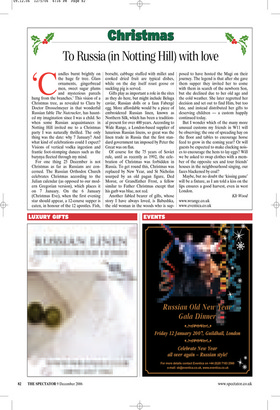To Russia (in Notting Hill) with love
‘C andles burnt brightly on the huge fir tree. Glass ornaments, gingerbread men, sweet sugar plums and mysterious parcels hung from the branches.’ This vision of a Christmas tree, as revealed to Clara by Doctor Drosselmeyer in that wonderful Russian fable The Nutcracker, has haunted my imagination since I was a child. So when some Russian acquaintances in Notting Hill invited me to a Christmas party I was naturally thrilled. The only thing was the date: why 7 January? And what kind of celebrations could I expect? Visions of vertical vodka ingestion and frantic foot-stomping dances such as the barynya fleeted through my mind.
For one thing 25 December is not Christmas as far as Russians are concerned. The Russian Orthodox Church celebrates Christmas according to the Julian calendar (as opposed to our modern Gregorian version), which places it on 7 January. On the 6 January (Christmas Eve), when the first evening star should appear, a 12-course supper is eaten, in honour of the 12 apostles. Fish, borscht, cabbage stuffed with millet and cooked dried fruit are typical dishes, while on the day itself roast goose or suckling pig is served.
Gifts play as important a role in the rites as they do here, but might include Beluga caviar, Russian dolls or a faux Fabergé egg. More affordable would be a piece of embroidered Russian linen, known as Northern Silk, which has been a traditional present for over 400 years. According to Wide Range, a London-based supplier of luxurious Russian linens, so great was the linen trade in Russia that the first standard government tax imposed by Peter the Great was on flax.
Of course for the 75 years of Soviet rule, until as recently as 1992, the celebration of Christmas was forbidden in Russia. To get round this, Christmas was replaced by New Year, and St Nicholas usurped by an old pagan figure, Ded Moroz, or Grandfather Frost, a fellow similar to Father Christmas except that his garb was blue, not red.
Another fabled bearer of gifts, whose story I have always loved, is Babushka, the old woman in the woods who is sup posed to have hosted the Magi on their journey. The legend is that after she gave them supper they invited her to come with them in search of the newborn Son, but she declined due to her old age and the cold weather. She later regretted her decision and set out to find Him, but too late, and instead distributed her gifts to deserving children — a custom happily continued today.
But I wonder which of the many more unusual customs my friends in W11 will be observing; the one of spreading hay on the floor and tables to encourage horse feed to grow in the coming year? Or will guests be expected to make clucking noises to encourage the hens to lay eggs? Will we be asked to swap clothes with a member of the opposite sex and tour friends’ houses in the neighbourhood singing, our faces blackened by coal?
Maybe, but no doubt the ‘kissing game’ will be a fixture, as I am told a kiss on the lips ensures a good harvest, even in west London.
Kft Wood www.wrange.co.uk
www.eventica.co.uk


























































































 Previous page
Previous page